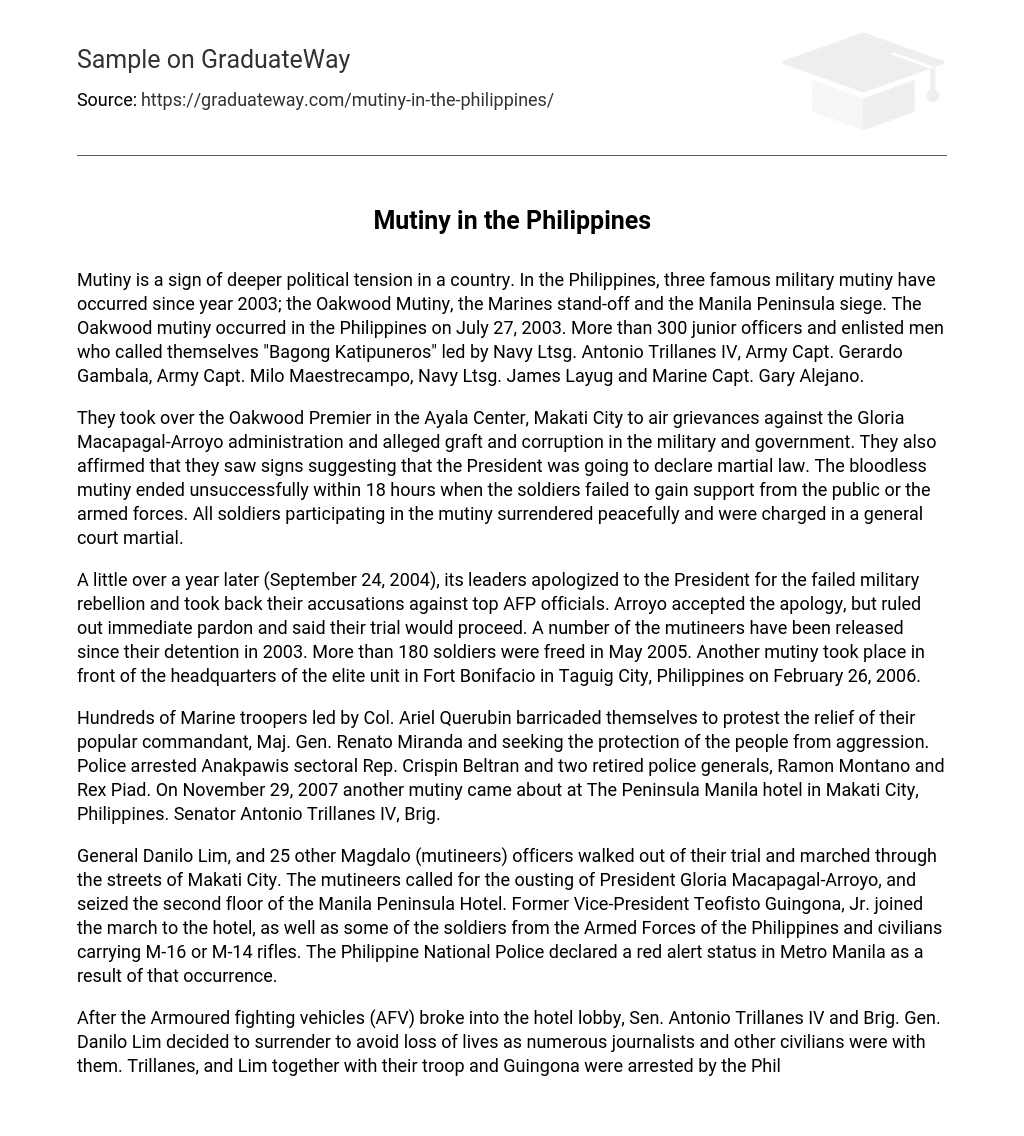Mutiny in the Philippines has been a recurring indicator of political tensions. Since 2003, there have been three notable instances: the Oakwood Mutiny, the Marines stand-off, and the Manila Peninsula siege. The Oakwood mutiny occurred on July 27, 2003, led by Navy Ltsg. Antonio Trillanes IV, Army Capt. Gerardo Gambala, Army Capt. Milo Maestrecampo, Navy Ltsg. James Layug, and Marine Capt. Gary Alejano. Over 300 junior officers and enlisted men took part in this mutiny as “Bagong Katipuneros.”
The Oakwood Premier in the Ayala Center, Makati City was taken over by soldiers who wanted to voice their complaints against the Gloria Macapagal-Arroyo administration and alleged corruption in the military and government. Additionally, they believed that martial law was imminent based on certain indications. However, the mutiny, which lasted 18 hours, did not succeed as they did not receive support from the public or the armed forces. The soldiers involved surrendered peacefully and were subsequently charged in a general court martial.
In September 24, 2004, the leaders of the failed military rebellion apologized to the President and retracted their accusations against top AFP officials. Arroyo accepted the apology but refused to grant immediate pardon, stating that their trial would continue. Some of the mutineers have been released since their detention in 2003, with over 180 soldiers set free in May 2005. Another mutiny occurred on February 26, 2006, in front of the headquarters of the elite unit in Fort Bonifacio, Taguig City, Philippines.
Hundreds of Marine troopers, led by Col. Ariel Querubin, barricaded themselves to protest the relief of their popular commandant, Maj. Gen. Renato Miranda, and sought protection from aggression. Police arrested Anakpawis sectoral Rep. Crispin Beltran and two retired police generals, Ramon Montano and Rex Piad. On November 29, 2007, another mutiny occurred at The Peninsula Manila hotel in Makati City, Philippines. Senator Antonio Trillanes IV and Brig.
General Danilo Lim and a group of 25 other Magdalo officers, who were referred to as mutineers, decided to abandon their trial. They proceeded to march through the streets of Makati City while demanding the removal of President Gloria Macapagal-Arroyo. Eventually, they took control over the second floor of Manila Peninsula Hotel. Former Vice-President Teofisto Guingona, Jr. joined them on this march towards the hotel. Additionally, some soldiers from the Armed Forces of the Philippines and civilians armed with M-16 or M-14 rifles also accompanied them.
Due to this event, the Philippine National Police declared a red alert status in Metro Manila.
Following the entry of Armoured fighting vehicles (AFV) into the hotel lobby, Sen. Antonio Trillanes IV and Brig. Gen. Danilo Lim chose to surrender in order to prevent any loss of life, as there were journalists and civilians present. Trillanes, Lim, their troop, and Guingona were arrested by the Philippine National Police and taken to the National Capital Region Police Office headquarters in Camp Bagong Diwa, Taguig City. On October 12, 2010, President Benigno Aquino III signed Proclamation No. 0, which grants amnesty to current and former armed forces personnel and their supporters who may have committed punishable acts or omissions in connection with the Oakwood Mutiny in July 2003, the Marines stand-off in February 2006, the Manila Peninsula siege in November 2007, and related incidents. This proclamation still needs Senate concurrence. The reactions to this proclamation vary greatly among the public.
Personally, I believe that the accused soldiers deserve amnesty because they played a vital role in our fight against corruption. Their actions were not illegal or criminal as there was no coup d’etat. Instead, they simply expressed their strong opposition to the anomalies in the previous administration. Their actions were not unconstitutional, as they had the right to express themselves, even if it meant going to a hotel. In my opinion, what they did was patriotic.
Escudero contends that the reason individuals were labeled as criminals is solely due to their failure. Yet, in past triumphant revolts, they were celebrated as heroes. Although some intellectuals perceive the proclamation as a detrimental instance, I hold a contrasting viewpoint. It would not provoke further rebellions or foster military adventurism. Instead, it would aid the government in restoring faith and allegiance within the armed forces. In essence, implementing such a declaration would ultimately prove advantageous for the nation.
President Aquino’s decision to grant amnesty to the soldiers may not have been well-received, but it was done with good intentions. It is possible that he wanted to quickly address the soldiers’ cases in order to move on from the wrongdoings of the previous administration and allow the soldiers to begin anew. The goal is to bring closure to the issue and make productive use of their skills. After all, they were not meant to languish in prison. In addition to forgiveness, what these brave soldiers truly deserve is our understanding and compassion.





